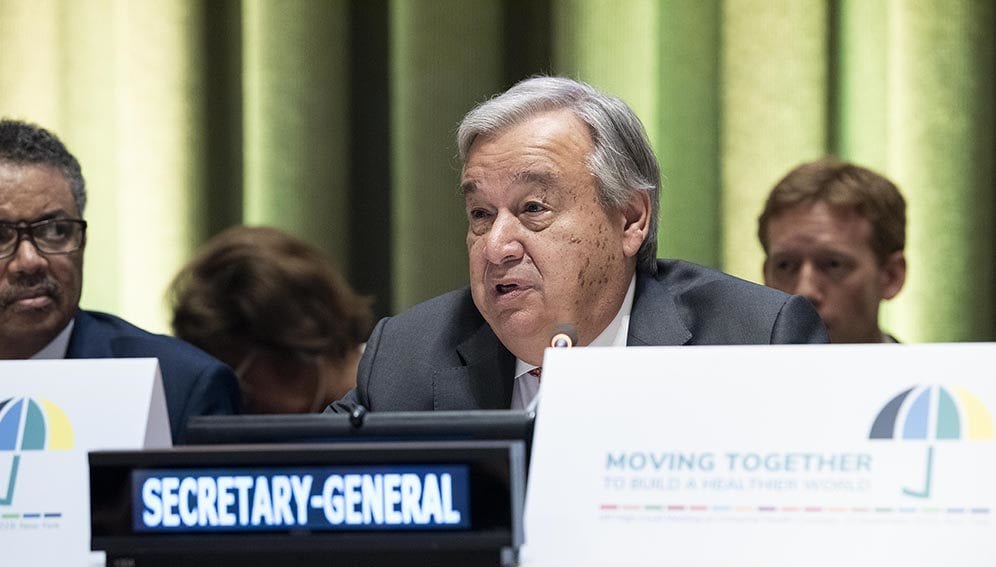25/09/19
World leaders sign historic declaration on universal health coverage

By: Fatima Arkin
Send to a friend
The details you provide on this page will not be used to send unsolicited email, and will not be sold to a 3rd party. See privacy policy.
World leaders kicked off the high-level week of the UN General Assembly in New York this week by adopting what UN chief António Guterres called “the most comprehensive agreement ever reached on global health”.
It came a day after a World Health Organization (WHO) report warned that, if current trends continued, up to 5 billion people will still be without access to healthcare in 2030 – the deadline world leaders have set for achieving universal health coverage.
The UN’s political declaration on universal health coverage (UHC) signed by member states at a high-level meeting on 23 September recommits countries to advancing towards this goal, scaling up efforts to improve global health.
“Accelerating progress toward UHC (universal health coverage) is critical to alleviating extreme poverty and boosting shared prosperity,”
David Malpass, president of the World Bank Group
The declaration included commitments on financial risk protection to ensure that no one suffers hardship from out-of-pocket healthcare payments, as well as promising high-impact health interventions to combat diseases and measures to protect women’s and children’s health.
At the meeting, UN Secretary-General Guterres called for an urgent change to the “financing paradigm” to “step up the pace of investment” towards UHC.
The WHO’s Universal Health Coverage Monitoring Report released on Sunday highlighted the need for countries to invest at least one per cent of their gross domestic product (GDP) on primary healthcare to close “glaring coverage gaps” and meet healthcare targets agreed under the 2015 Sustainable Development Goals (SDGs).
The report says investing an additional US$200 billion a year on scaling up primary healthcare services in low- and middle-income countries could save 60 million lives, increase average life expectancy by 3.7 years by 2030, and contribute significantly to socioeconomic development.
Speaking at a press briefing last week ahead of the launch, Pete Salama, WHO’s executive director for UHC and Life Course, said: “Even though it seems like a large sum, we know that most countries can actually afford to do this, based on their domestic resources. It’s only a handful of countries that require international aid in order to scale up their primary healthcare.”
Globally, health coverage is improving, but the rate of progress has slowed in the past decade on issues such as tackling non-communicable diseases and improving health systems, the report notes.
In 2017, between one-third and half (33 per cent and 49 per cent) of the world’s population were covered by essential health services. If current trends continue this is expected to increase to between 39 per cent and 63 per cent by 2030.
“In many ways, we may have reached the natural limits of our previous global health models,” added Salama.
At the same time, poverty related to healthcare expenses is increasing despite overall poverty rates declining. The incidence of catastrophic health expenditure — defined in the SDGs as large out-of-pocket spending in relation to household consumption or income — increased continuously between 2000 and 2015. Around 930 million people spent more than 10 per cent of their household income on basic healthcare in 2015 and about 210 million people spent more than 25 per cent in the same year, according to the report.
David Malpass, president of the World Bank Group, told the high-level UN meeting on Monday that 90 million people were being pushed into extreme poverty as a direct result of this spending.
“Accelerating progress toward UHC is critical to alleviating extreme poverty and boosting shared prosperity,” he said.
“Health is also an economic imperative as it is one of the global economy’s largest sectors, providing 50 million jobs — and the majority for women.”
Benoit Kalasa, director of the technical division of the UN Population Fund (UNFPA), told SciDev.Net that in order to drive progress towards universal health coverage it was important to understand why some people were not using health services, beyond the obvious financial considerations.
He points to gender inequality, which prevents women in some communities from accessing family planning services, and a lack of sex education for young people in low- and middle-income countries because of prevailing social norms.“What do we have as consequences? Young people lack the right information, so they end up with sexually transmitted disease or unwanted pregnancies,” said Kalasa.
Alex Harris, head of global policy for UK-based health research foundation Wellcome, said more research and innovation was needed if health SDGs are to be met.
He said that “promising innovations often do not reach those who need them most,” adding: “This needs to change. We need to work with countries to build a research system based on equity and access.”













